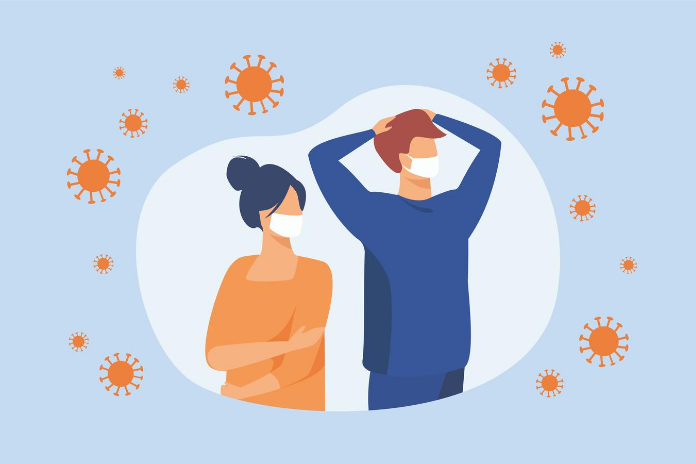
The first months of quarantine weren’t as hard for Rachel Kirchner, 41, as she’d expected.
There were disappointments, of course—no summer camps, a canceled trip to Israel—but the Potomac mother of three adapted relatively easily to ordering groceries online and only venturing out when absolutely necessary. (The above-ground pool her family recently added to the backyard did provide some relief.)
As Montgomery County inches into reopening, though, Kirchner is finding that her anxiety is inching up as well.
“Quarantine is definitely getting harder now that people are doing less of it,” she says.
“I feel like the world isn’t ready to reopen, and it’s going to be harder for us to continue to make safe choices if more people around us are not making safe choices. It’s stressful.”
Experiencing re-entry anxiety
Feeling something similar? According to North Bethesda psychologist Brooke Stipelman, your worry is completely normal. “When quarantine started, we had several months where we were sent this strong message of ‘you need to stay home to be safe,’ so it’s going to take time for the resonance of that message to lose its power,” she says.
The first step to quelling re-entry anxiety is gathering the knowledge necessary to assess your ability to safely reenter the world around you. While a second wave of cases is hitting cities like Houston and Miami, things are, according to Dr. Manu D. Kaushal, trending in the opposite direction for Montgomery County. He should know—as MedStar Montgomery Medical Center’s Director of Critical Care and Pulmonary Rehabilitation, Kaushal spent most of April and May tending to COVID-related cases in the ICU, but he has seen a steady decline through June.
As the months have progressed, Dr. Kaushal has noted the same new symptoms as the CDC. “We are now aware that loss of taste and smell is a major sign, and we have seen patients with nausea, vomiting and diarrhea in addition to runny nose, coughing, fever and muscle ache,” he says and urges anyone experiencing such symptoms to get tested and self-isolate immediately. (This is true even if you’ve already had COVID-19, as cases of reinfection are being reported.)
When it comes to educating himself about local spread, Kaushal eschews national media outlets in favor of local portals—and suggests that you do the same.
“There is so much data, and a lot of it does not pertain to you,” he says. “The best thing to use locally is the dashboard on Montgomery County’s website.”
Stipelman agrees. “People tend to overestimate perceptions of a threat, especially [when they see it] all the time on the news and social media. You have to be careful about where you get your information. Rely on objective state and county data. That can help you make decisions that are proportionate to your individual level of risk based on where you live.”
Per Kaushal, the most important stats to track on this front are the positivity rate of local testing results—“It should stay under five percent,” he says—and intensive care utilization, which “should stay under 70 or 80 percent.” These stats will become especially important if, as Kaushal and many other medical experts predict, we see a resurgence of cases in the fall or winter.
Taking small steps
In the meantime, if you do not fall into a high-risk category, you can mitigate anxiety surrounding a return to “normal” life by taking small steps and being strategic about the activities you choose to do.
“Don’t go from completely isolating yourself at home to being in a crowded indoor bar,” says Stipelman. Instead, she recommends a form of treatment called exposure therapy.
“Exposure therapy is essentially facing your fear,” she explains. “If you can confront it, you’re more likely to see that the terrible thing you’ve been thinking about actually won’t come true.”
To exercise a form of exposure therapy on yourself, Stipelman recommends creating a list of activities that vary in levels of exposure and risk. Try something that carries very little risk, like walking outside, and slowly work your way up to something like grabbing ice cream with a friend as you begin to feel more comfortable. Do so while wearing a mask and maintaining distance and you’ll continue to minimize risk while reacclimating in a way that works for you.
When making your list, choose activities that are meaningful so the reward of the activity will outweigh the risk.
Read more: A new book by Bethesda native George Zaidan examines packaged ingredients we consume and apply on our bodies every day
“Do the things that are going give you the most joy,” Stipelman says. “If someone is
extroverted, an outdoor interaction with friends is going to feel very fulfilling, but maybe they’ll skip getting a pedicure because they can do that by themselves at home.”
But what happens if you make it out, only to be hit with a bout of panic in the middle of soup aisle? For situations like this, Stipelman uses cognitive behavioral therapy to help clients reframe negative thoughts in a way that’s more neutral and balanced.
“If you go to the store and someone passes by you without a mask, you could start to feel anxious that you’ve contracted the virus,” she says. “Rather than letting your thoughts spiral, begin to challenge them.”
What’s the likelihood that person has the virus? If they do have it, what’s the likelihood that you were exposed to enough of it in moment they passed to actually get you sick? And if you do get sick, what’s the likelihood you would become seriously ill? Asking yourself these questions will provide a more realistic perspective on the situation.
If that fails, try a deep breath—four seconds on the inhale, six on the exhale.
“The thing about anxiety is that it’s very future-oriented,” says Stipelman. “Anything that redirects your attention to the here and now is helpful.”
A version of this story appeared in the August-September issue of Montgomery Magazine.




